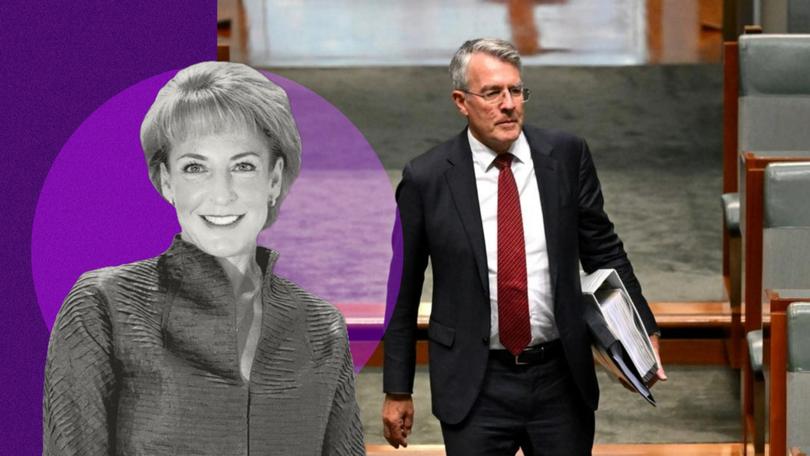MICHAELIA CASH: Labor Government’s breathtaking tale of incompetence revealed at Senate Budget estimates

Senate Budget estimates is a vital part of the democratic process.
During estimates the Government, its bureaucratic departments and agencies are held to account for the decisions they make and the way in which those decisions are implemented.
This process played out in Canberra over the past two weeks, with senators asking thousands of questions over hundreds of hours.
Sign up to The Nightly's newsletters.
Get the first look at the digital newspaper, curated daily stories and breaking headlines delivered to your inbox.
By continuing you agree to our Terms and Privacy Policy.Much of what is said at estimates can best be described as a little dry or even dull.
But sometimes, under questioning, little-known details of how we are being governed come spilling out.
Every now and then, if you can get through the bureaucratic speak, you will find real-life scenarios that seem to have been lifted directly from the script of the satirical political show Utopia.
For example, hidden among the recent budget papers is a breathtaking tale of incompetence on the part of the Albanese Labor Government’s Attorney-General Mark Dreyfus when it comes to appointing judges to Australia’s frontline courts.
The Attorney-General has made a series of decisions around judicial appointments that are inexplicable and would be laughable if the impacts on ordinary Australians weren’t so serious.
During questions I put to the Attorney-General’s department it was revealed that Mr Dreyfus has sacked the Chief Justice of the Federal Circuit and Family Court of Australia from a panel that recommends who should be appointed as a Judge to the court he oversees.
Utopia scriptwriters take note! The Chief Justice no longer has a say in the hiring of judges.
This is a situation you wouldn’t encounter in any other organisation. If you told Woolworths they weren’t allowed to have a say in who came to work for them you’d be laughed out of town.
But wait, there’s more. It was also revealed that in just two years, Mr Dreyfus has racked up over 2000 days of delays in appointing judges to the bench of the Division 2 court. In one case, he left a position vacant for more than 14 months.
You would need to appoint an extra judge to work in that court and have them work for more than five years before you could catch up the time he has lost.
And that is before you even start to include the additional 10 judges that he’s promised, but never delivered.
But this is not the Attorney-General’s only candidate for a new episode of Utopia.
There’s the one in which the Attorney-General has made the letter R the most expensive letter in the alphabet.
We can say that because the Budget papers from this Albanese Government make it clear that it intends to spend $1 billion of Australians’ money to change the Administrative Appeals Tribunal to the Administrative Review Tribunal. The AAT becomes the ART.
And the cost? That’s right. One. Billion. Dollars.
So what do you, the Australian taxpayers, get for your $1 billion?

Before this groundbreaking initiative, Australians had an administrative tribunal that reviewed government decisions. After the change, Australians get an administrative tribunal that reviews government decisions, at a cost of $1 billion.
Before this amazing policy reform, Australians could apply for a merits review of a government decision that affected them. Afterwards, they can apply for a merits review of a decision that affects them, but they will pay much, much more for it.
Before this change, we had a body of tribunal members roughly half of whom were appointed by a Labor government. Afterwards, we will have a body appointed entirely by a Labor government.
You’d be forgiven for thinking that this may just be the most expensive rebranding of a public service body in Australian political history.
Then there is the Australian Human Rights Commission, an agency within the Attorney-General’s portfolio, which has policy responsibility for human rights and anti-discrimination but has a festering problem with anti-Semitism. This one is far too serious for Utopia.
In estimates, we had extraordinary scenes where the head of the AHRC refused to condemn Hamas, the terrorist organisation which raped, tortured and murdered more than 1200 Israelis in October last year.
We know that the phrase “from the river to the sea” calls for the violent destruction of the state of Israel and the Jewish people. The Prime Minister himself has called it a violent phrase.
But when asked if he supported the Prime Minister’s view that the phrase was a violent phrase, the Race Discrimination Commissioner said he would “have to look at the context”.
There’s a pattern of conduct within the AHRC where anti-Semitism is overlooked, or actively tolerated.
My final estimate example — there are far too many to fit into this space — comes from the Department of Employment and Workplace Relations, overseen by Minister Tony Burke.
We are truly back in the Utopia territory.
DEWR admitted it has underpaid 201 staff — around 5 per cent of its workforce — and has had to repay $243,063 to affected employees. Meanwhile, the Department has accumulated over $300,000 in expenses trying to fix the issue.
Those expenses included over $168,000 on data analysis and calculation of entitlements, more than $116,000 on legal advice and over $15,000 on communication advice.
Mr Burke continually lectures the business community saying they should “just pay people properly” but his own department can’t live up to that standard.
As this debacle has highlighted the complex nature of the industrial relations system makes it difficult for employers to get these matters right.
What chance do small and medium businesses have if the department that oversees the system, with all its vast resources, can’t get it right?
And therein lies my nomination for the Utopia episode of the year — so far.
Michaelia Cash is a Liberal Senator for WA.
